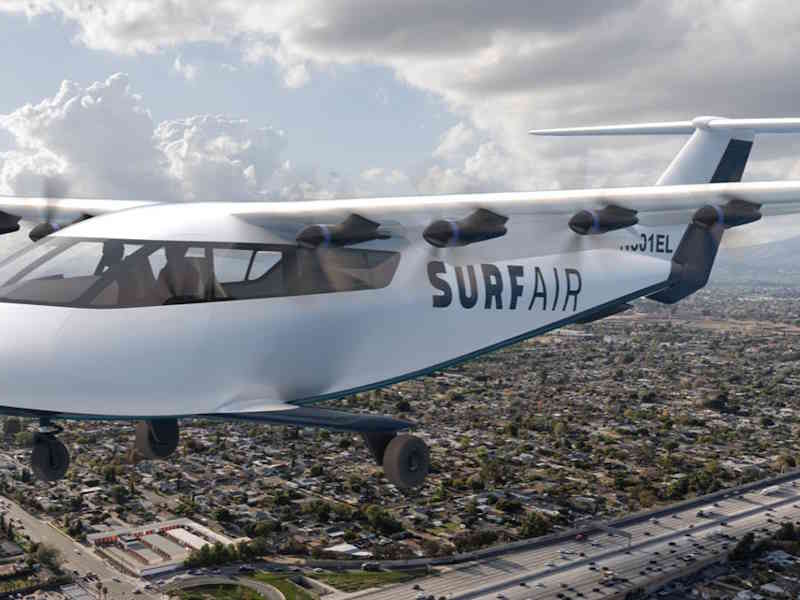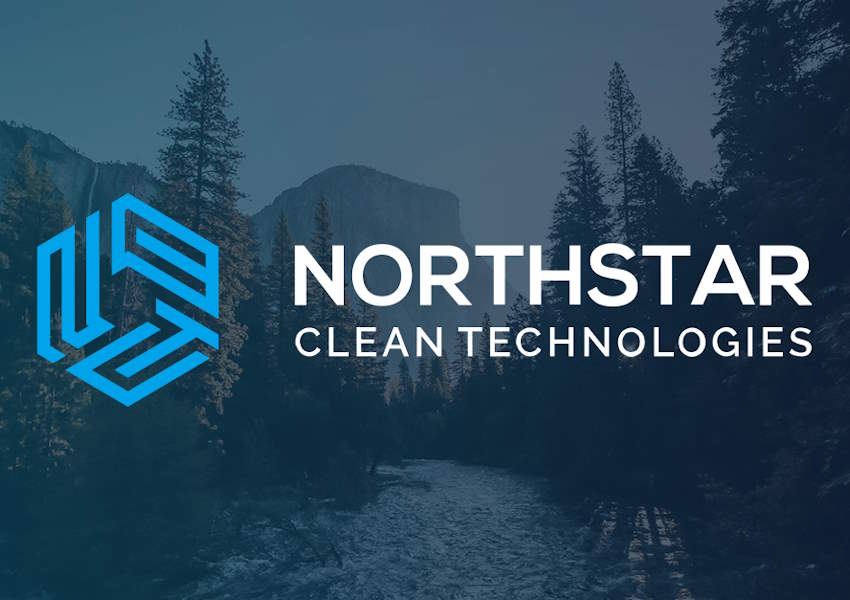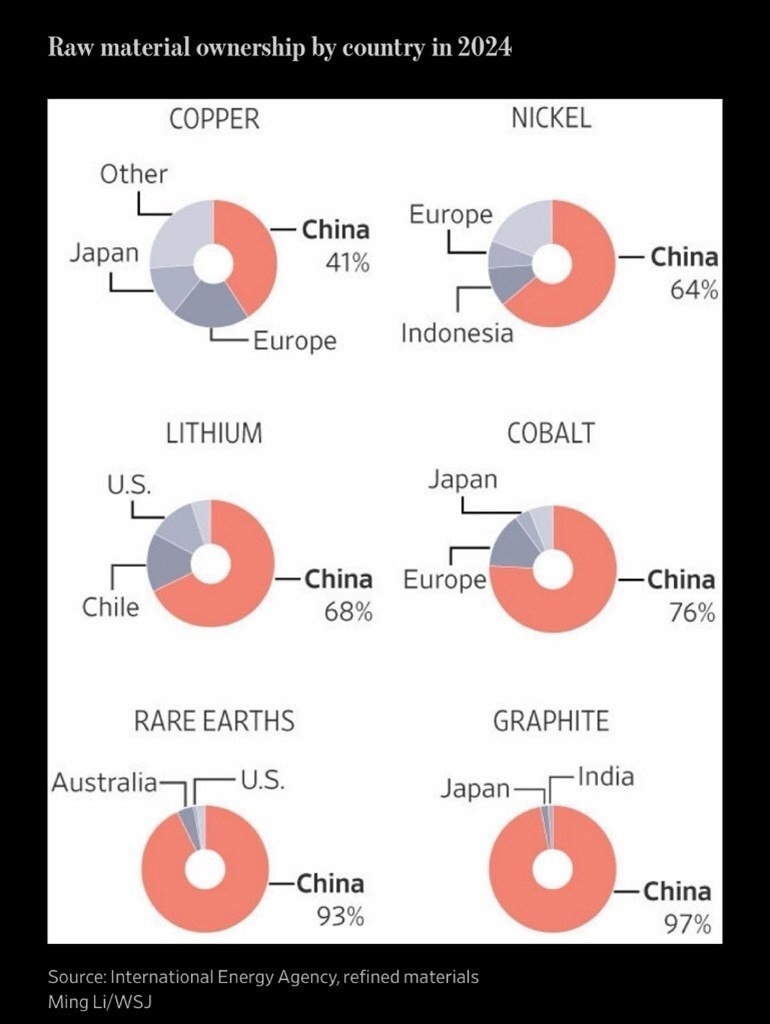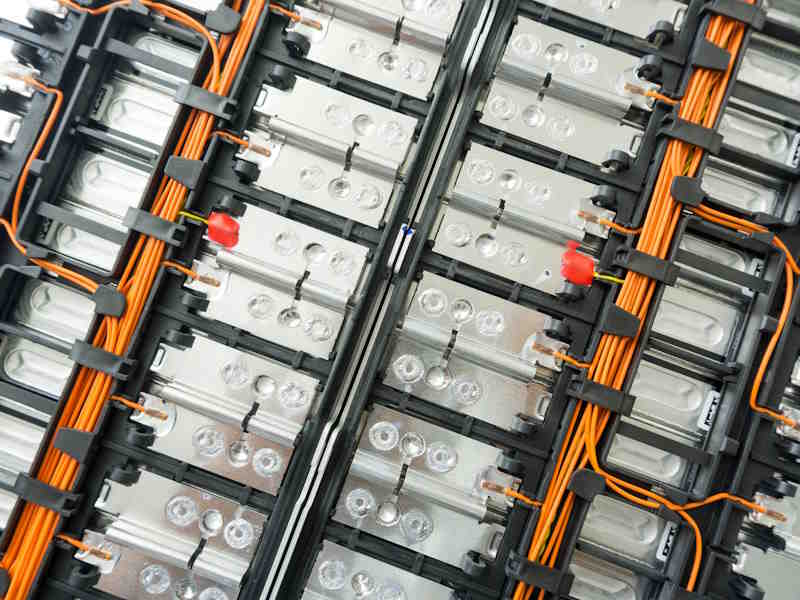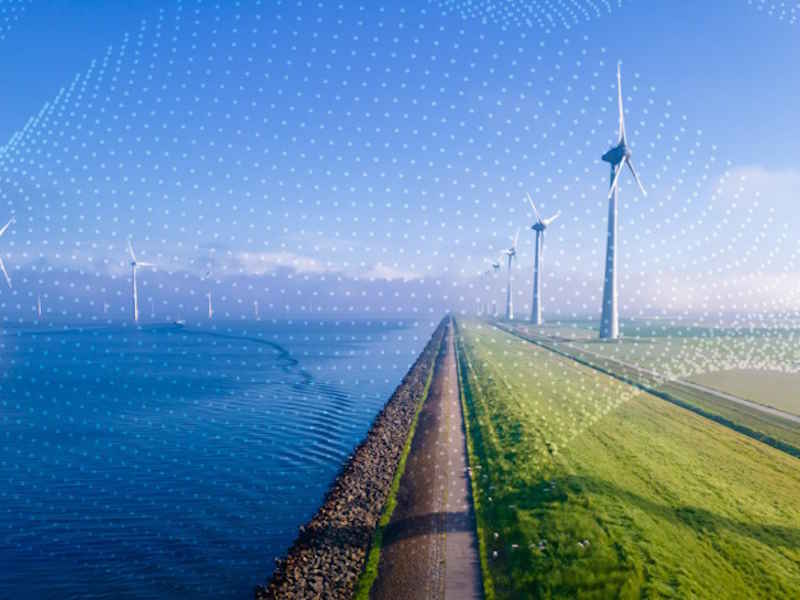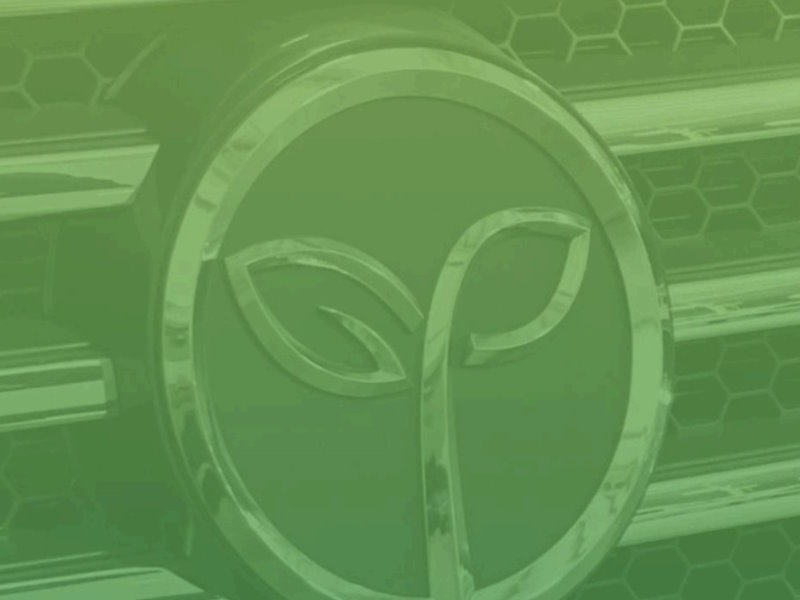Plug Into More Green Stock News
Tap into the pulse of emerging green sectors every morning. Top daily headlines from clean energy, cleantech, cannabis, and sustainable transport stocks:
Appia Rare Earths & Uranium Provides 2022 Drilling Update for WRCB and Augier and Confirms Continuity of Very Significant Augier Discovery at Alces Lake Rare Earth Property, Northern Saskatchewan
Appia Rare Earths & Uranium Corp. (CSE: API) (OTCQB: APAAF) (FSE: A0I0) (FSE: A0I.F) (FSE: A0I.MU) (FSE: A0I.BE) (the "Company" or "Appia") is pleased to provide an update on 2022 drilling, particularly related to the new discovery zone at Augier, on the 100%-owned Alces Lake high-grade rare earth elements ("REE") and gallium property, Athabasca Basin area, northern Saskatchewan.
Highlights:
- Program total of 54 holes drilled so far in 2022 with a total of 10,047 metres drilled in less than 10 weeks - congratulations to the Alces Lake team!
- Expansion of WRCB area along strike to the southeast with no boundary found to date.
- Total of 24 holes drilled in 2022 on the Augier discovery confirm a thick zone of anomalous radioactivity in REE-bearing pegmatite. Delineation drilling is continuing.
- Augier discovery is a potential AMP zone look-alike - waiting on assay results to assess.
Frederick Kozak, President of Appia said: "The Augier discovery is a significant rare earth-bearing zone within what appears to be a continuous km-scale geological structure. It is massive - the radiometric anomaly is 300 metres in strike length and 175 metres wide. The mineralized interval is up to 70 metres in drilled width and has been intersected over 100 metres down dip. So far, the zone is open to the NNW, SSE and down-dip, it has no boundaries and it outcrops at surface. We eagerly await the assay results to determine just how big a REE discovery we have made."
Augier Discovery -positive drilling results
As previously reported, the Augier discovery was prospected in 2018 and was channel sampled in 2021. The 2021 assay results returned 7 metres of 0.57wt% TREO with intervals of 1.35 wt% TREO (0.59 metres) and 1.57 wt% TREO (0.40 metres). The discovery is located approximately 1,500 metres directly southeast of the WRCB area, along a well-defined kilometres-scale structural corridor.
Figure 1: Augier Drilling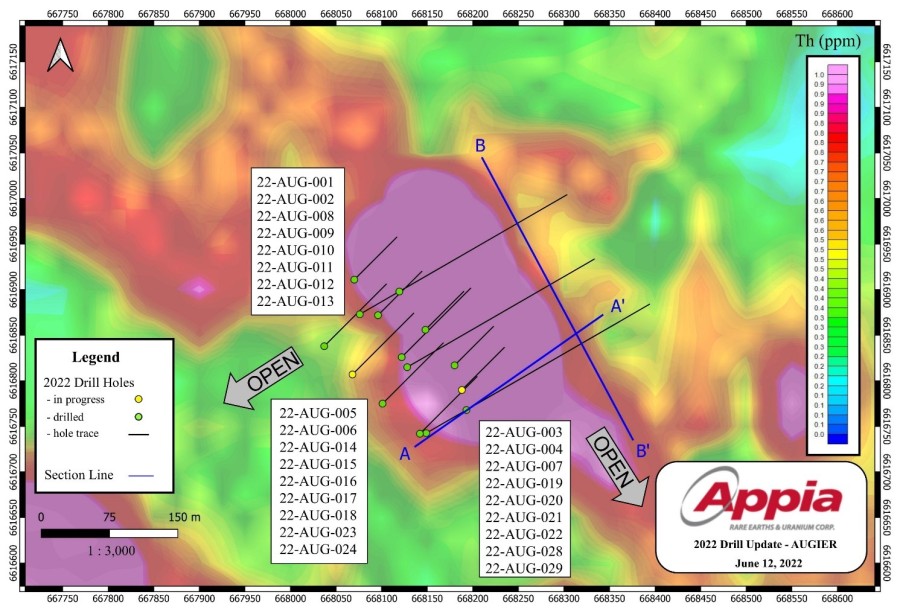 Figure 1. Current status of Appia's 2022 exploration drilling program at the Augier area. Newly completed 2022 drillholes are shown with white collar points and trace lines over a Thorium distribution map derived from Appia's 2021 airborne radiometric survey.
Figure 1. Current status of Appia's 2022 exploration drilling program at the Augier area. Newly completed 2022 drillholes are shown with white collar points and trace lines over a Thorium distribution map derived from Appia's 2021 airborne radiometric survey.
An extensive drilling program is underway with two drills working on the prospect. To date, a total of 4,040 metres in 24 holes have been drilled at Augier with two holes per setup. In addition, a large (100 kg) surface sample was taken from the immediate vicinity of the first two Augier holes. A total of 87 samples from the first hole at 22-AUG-001 have been sent for assay as well as the Augier large surface sample with assay results expected within 2 months.
The map in Figure 1 above shows that the zone of interest is open in both strike directions (north-northwest and south-southeast) as well as in the dip direction to the west-southwest. Figure 2 and Figure 3 (shown below) provide longitudinal and cross-sections through the prospect.
Figure 2: Longitudinal Section at Augier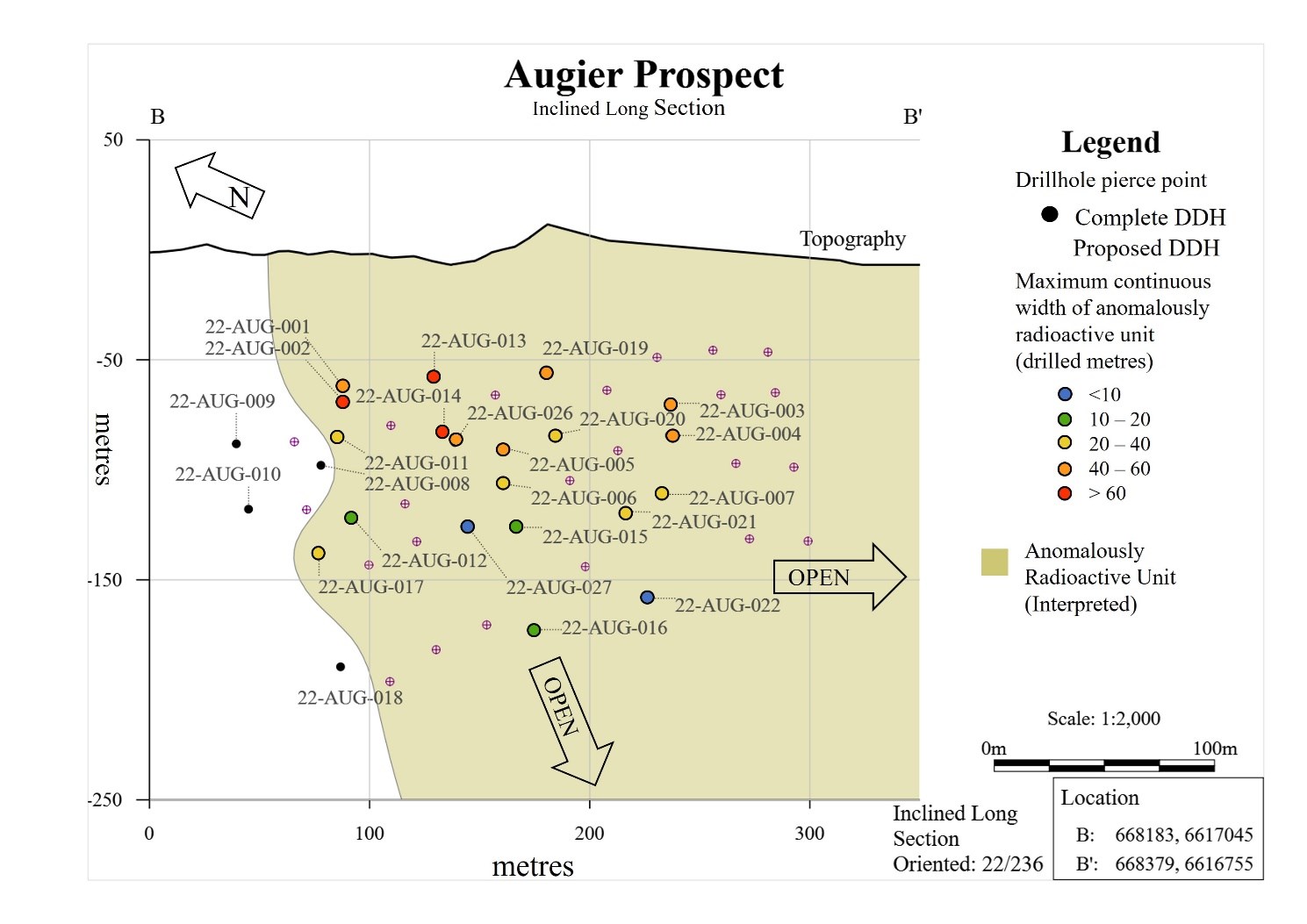 Figure 2. Representative longitudinal section through Augier discovery based on drilling results interpreted to date.
Figure 2. Representative longitudinal section through Augier discovery based on drilling results interpreted to date.
Note in Figure 2 at surface the length of the prospective zone shown in the inclined longitudinal section is approximately 300 metres. So far, there are no limits to strike extent. The zone remains open at depth after drilling to over 100 metres down dip.
Figure 3: Schematic Cross-Section at Augier Figure 3. Schematic cross section through Augier discovery based on drilling results interpreted to date.
Figure 3. Schematic cross section through Augier discovery based on drilling results interpreted to date.
As shown above in Figure 3, the cross-section of the zone of interest has been intersected over 100 metres down dip from surface with no boundary found down dip
This discovery had not been drilled until 2022. The very first hole drilled into the discovery in 2022 intersected an encouraging 51.2 metres of anomalous radioactivity beginning at surface, with similar results from holes in the ongoing drilling program (see Table 1). The drilled width of this near-surface anomaly is unprecedented when compared to previous drilling campaigns at Alces Lake. Core has been sampled and submitted for assay from the first hole. Drilling details to date are summarized below in Table 1.
The Augier anomalous radioactive zone has similar mineralization to the AMP zone at WRCB. Visually, the zone is consistent through all of the Augier holes. Early assay results from 22-AUG-001 will be compared with the WRCB assay results in hand to further assess the zone potential .in this Augier discovery.
While the anomalous radioactive zone at Augier is at surface and the AMP zone at WRCB is plunging, Appia has not yet determined a conclusive link between the two zones. Also, there is substantial drilling to be done in the approximate 1,500 metre distance between WRCB and Augier to determine further potential continuity of the AMP zone and the thick anomalous radioactive zone at Augier.
Table 1. 2022 Augier drillhole details current to June 11, 2022.
Location information is presented in NAD 83 / UTM Zone 12N
| Hole ID | Easting | Northing | Azimuth | Dip | Anomalous Radioactivity (m) | Final Length (m) |
| 22-AUG-001 | 668119 | 6616898 | 60 | 45 | 51.2 | 299 |
| 22-AUG-002 | 668119 | 6616898 | 60 | 60 | 70.1 | 204 |
| 22-AUG-003 | 668193 | 6616768 | 60 | 45 | 58 | 255.26 |
| 22-AUG-004 | 668193 | 6616768 | 60 | 60 | 47.3 | 79.91 |
| 22-AUG-005 | 668128 | 6616815 | 60 | 45 | 50.5 | 356.96 |
| 22-AUG-006 | 668128 | 6616815 | 60 | 60 | 25 | 201 |
| 22-AUG-007 | 668148 | 6616742 | 60 | 45 | 39 | 171 |
| 22-AUG-008 | 668076 | 6616873 | 60 | 45 | - | 180 |
| 22-AUG-009 | 668070 | 6616911 | 45 | 45 | - | 102 |
| 22- AUG -010 | 668070 | 6616911 | 45 | 75 | - | 99 |
| 22- AUG -011 | 668096 | 6616872 | 45 | 45 | 27 | 159 |
| 22- AUG -012 | 668096 | 6616872 | 45 | 80 | 12 | 154.9 |
| 22- AUG -013 | 668148 | 6616856 | 45 | 45 | 70 | 126 |
| 22- AUG -014 | 668148 | 6616856 | 45 | 75 | 62.5 | 117 |
| 22- AUG -015 | 668101 | 6616775 | 45 | 45 | 19.9 | 186 |
| 22- AUG -016 | 668101 | 6616775 | 45 | 80 | 29 | 192 |
| 22- AUG -017 | 668037 | 6616838 | 45 | 45 | 40.5 | 130.5 |
| 22- AUG -018 | 668037 | 6616838 | 45 | 80 | 0.45 | 212 |
| 22-AUG-019 | 668170 | 6616816 | 45 | 45 | 47.5 | 123 |
| 22-AUG-020 | 668170 | 6616816 | 45 | 80 | 35.5 | 138 |
| 22-AUG-021 | 668142 | 6616742 | 45 | 45 | 37 | 190.5 |
| 22-AUG-022 | 668142 | 6616742 | 45 | 80 | 3.8 | 132 |
| 22-AUG-026 | 668122 | 6616826 | 45 | 45 | 59 | 111 |
| 22-AUG-027 | 668122 | 6616826 | 45 | 80 | 4.8 | 117 |
Continued Delineation of the WRCB Discovery
Appia continues to delineate the magnitude of the rare earth elements discovery at WRCB with longer and deeper holes to build on the 2021 information collected. The results so far are encouraging. Initial 2022 drilling on WRCB has been completed and the drill has been moved to drill on the Augier discovery.
Of the 54 holes drilled in 2022, 30 have been drilled at WRCB and all holes in the WRCB complex have intersected intervals of anomalous radioactivity over drilled widths ranging up to 11.0 metres, some with visible monazite. The 2022 drilling has expanded the WRCB area of interest with identified intervals of anomalous radioactivity up to 120 metres further along strike to the southeast. This has increased the overall length of the trend of anomalous radioactivity in WRCB drill core from 160 metres to 280 metres of strike length. The WRCB area is still open along strike in both the north-northwest and south-southeast directions.
A very promising intercept was found in 22-WRC-024, which drilled into the Wilson zone. The core returned with 9 metres of significant mineralization from 38 metres to 47 metres, with a scintillometer reading up to 16,000 CPS. This is comparable to some of the other very high grade zones in WRCB at shallow depth, with TREO content to be determined in future assay results.
Additional 2022 exploration activities at WRCB will include an IP survey over the center of the WRCB discovery area to evaluate the method's applicability across the property.
Figure 4 - WRCB Area 2022 Drilling Campaign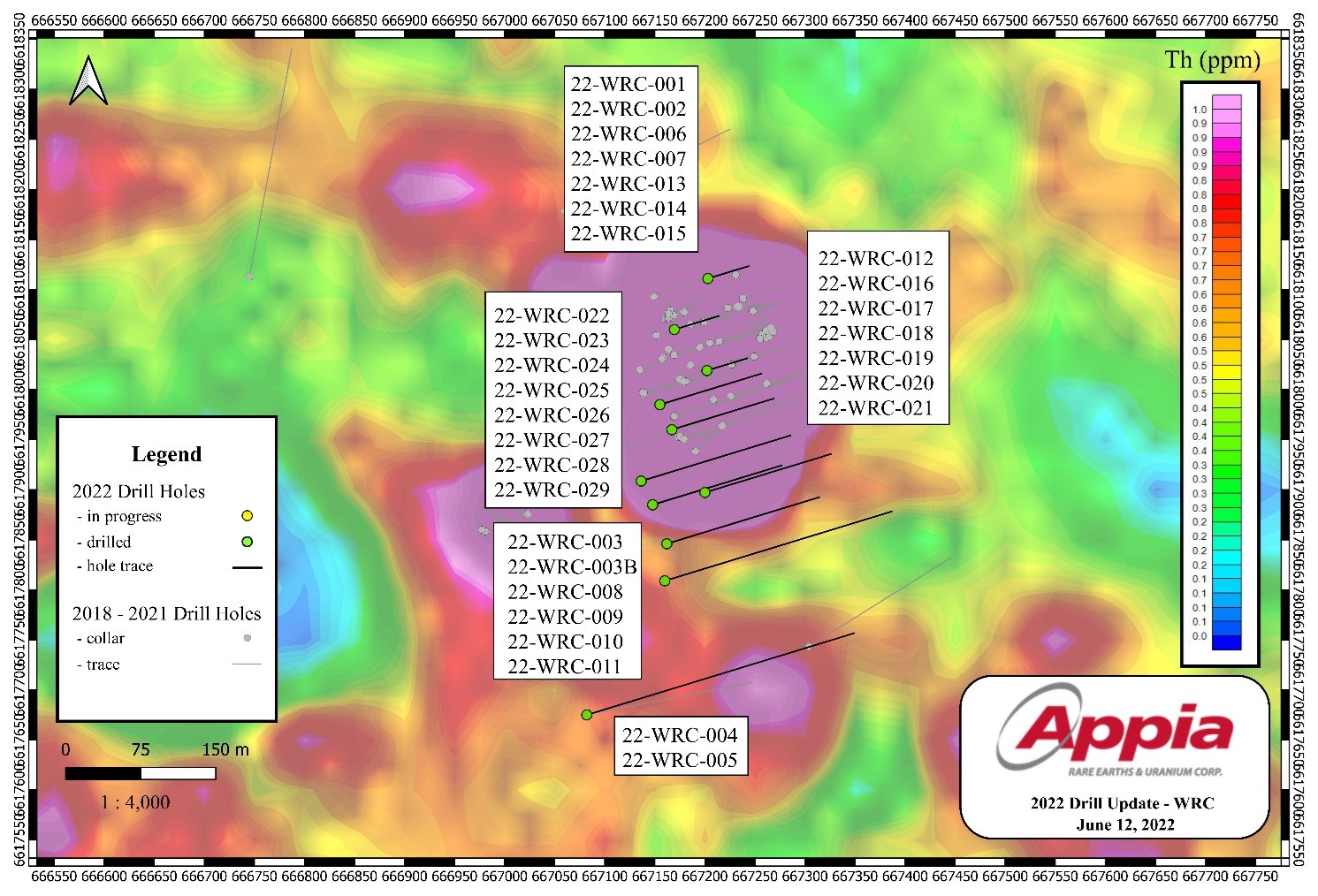
Figure 4. Current status of Appia's 2022 exploration drilling program at WRCB and area. Newly completed 2022 drillholes are shown with white collar points and trace lines over a Thorium distribution map derived from Appia's 2021 airborne radiometric survey.
About the Alces Lake Project
The Alces Lake project encompasses some of the highest-grade total and critical* REEs and gallium mineralization in the world, hosted within several surface and near-surface monazite occurrences that remain open at depth and along strike.
* Critical rare earth elements are defined here as those that are in short-supply and high-demand for use in permanent magnets and modern electronic applications such as electric vehicles and wind turbines (i.e: neodymium (Nd), praseodymium (Pr), dysprosium (Dy) and terbium (Tb)).
Appia commenced drilling at Alces Lake in mid-March 2022 and plans to drill significantly deeper holes compared to the 100 holes (approximately 8,076 metres) drilled in 2021. This is designed to allow Appia to determine continuity at depth and along the identified REE mineralization trends as the company works towards a maiden resource estimate in accordance with NI 43-101 for the area. With high-grade REE mineralization now identified in many locations within an area covering approximately 27 km2 of the Alces Lake block. the Company believes the project has the potential to be a world-class source of high-grade critical rare earth bearing monazite.
The Alces Lake project is located in northern Saskatchewan, the same provincial jurisdiction that is developing a "first-of-its-kind" rare earth processing facility in Canada (currently under construction by the Saskatchewan Research Council and scheduled to become operational in early 2023). The Alces Lake project area is 35,682 hectares (88,173 acres) in size and is 100% owned by Appia.
To ensure safe work conditions are met for the workforce, the Company has developed exploration guidelines that comply with the Saskatchewan Public Health Orders and the Public Health Order Respecting the Northern Saskatchewan Administration District in order to maintain social distancing and help prevent the transmission of COVID-19.
All lithogeochemical assay results were provided by Saskatchewan Research Council's Geoanalytical Laboratory, an ISO/IEC 17025:2005 (CAN-P-4E) certified laboratory in Saskatoon, SK. All analytical results reported herein have passed internal QA/QC review and compilation.
The technical content in this news release was reviewed and approved by Dr. Irvine R. Annesley, P.Geo, Advisor to Appia's Board of Directors, and a Qualified Person as defined by National Instrument 43-101.
About Appia
Appia is a Canadian publicly-listed company in the rare earth element and uranium sectors. The Company is currently focusing on delineating high-grade critical rare earth elements and gallium on the Alces Lake property, as well as exploring for high-grade uranium in the prolific Athabasca Basin on its Otherside, Loranger, North Wollaston, and Eastside properties. The Company holds the surface rights to exploration for 105,026 hectares (259,525 acres) in Saskatchewan. The Company also has a 100% interest in 12,545 hectares (31,000 acres), with rare earth element and uranium deposits over five mineralized zones in the Elliot Lake Camp, Ontario.
Appia has 121.5 million common shares outstanding, 142.2 million shares fully diluted.
Cautionary Note Regarding Forward-Looking Statements: This News Release contains forward-looking statements which are typically preceded by, followed by or including the words "believes", "expects", "anticipates", "estimates", "intends", "plans" or similar expressions. Forward-looking statements are not a guarantee of future performance as they involve risks, uncertainties and assumptions. We do not intend and do not assume any obligation to update these forward- looking statements and shareholders are cautioned not to put undue reliance on such statements.
Neither the Canadian Securities Exchange nor its Market Regulator (as that term is defined in the policies of the CSE) accepts responsibility for the adequacy or accuracy of this release.
For further information, please contact:
Tom Drivas, CEO and Director: (cell) 416-876-3957, (fax) 416-218-9772 or (email) This email address is being protected from spambots. You need JavaScript enabled to view it.
Frederick Kozak, President: (cellular) 403-606-3165 or (email) This email address is being protected from spambots. You need JavaScript enabled to view it.
Frank van de Water, Chief Financial Officer and Director, (tel) 416-546-2707, (fax) 416-218-9772 or (email) This email address is being protected from spambots. You need JavaScript enabled to view it.
Plug Into More Green Stock News
Tap into the pulse of emerging green sectors every morning. Top daily headlines from clean energy, cleantech, cannabis, and sustainable transport stocks:
More Green Stock News
More Green Stock News
| Last Trade: | US$0.15 |
| Daily Change: | -0.01 -6.25 |
| Daily Volume: | 1,100 |
| Market Cap: | US$29.160M |
December 09, 2025 September 15, 2025 June 12, 2025 May 21, 2025 | |
